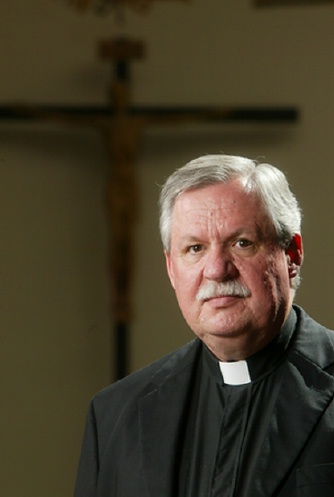The cover of the April 3, 2007 The Christian Century announces an article entitled “Why Men Say No to Church,” a review of Why Men Hate Going to Church by David Murrow. Murrow, according to Lillian Daniel, the reviewer and senior minister at the First Congregational Church (UCC) in Glen Ellyn, IL, thinks that church culture in general and worship in particular have been feminized. In Daniel’s characterization, “A chick-flick atmosphere prevails on Sunday mornings, complete with flowers, ferns and soft music, all geared toward women’s desires for safety, security, and harmonious relationships.”
Murrow opposes this new reality: “Women must humble themselves, pray and allow the men of the church to lead the body toward an adventure…Will you allow men to take risks, dream big, and push the envelope with your local church? God made men for adventure, achievement, and challenge, and if they can’t find those things in church, they’re going to find them somewhere else.” “Somewhere else,” according to Daniel, seems to be the movies, the local bar, sports events, TV, and perhaps worse.
So, what, precisely, characterizes Murrow’s remasculinzed church? Much depends, I think, on what Murrow calls the “adventure” God made men for. Do I seek adventure because in finding it I feel powerful, in-control, authoritative, self-satisfied? Or, is the goal outside myself – justice done, people liberated, human flourishing sparked?
Church at its best – religion at its best – embodies as its central premise that God calls his followers to move outside themselves in service, a move ironically that brings the follower back to herself in affirmation and fullness of life. My fear is that the men whom Murrow defends seek “adventure” that makes them feel powerful, in-control, authoritative, and so on.
Who would Murrow’s manly men hold up us their heroes and role models? John Wayne in The Quiet Man? The English kings that conquered the Welsh in the 13th century, the Irish in the 15th Century, and the Scots in the 18th Century? The English kings who tried to conquer and control French for three hundred years for no reason other than conquest?
I keep asking myself, What was accomplished by all that warfare? Was their a value outside and beyond the men involved, in particular, the leaders involved?
And, I ask myself, why should women and the feminine be disparaged because they – I – see this fighting as having no value because the fighting destroys much and produces little. Or, more precisely, the fighting produces nothing beyond the self-satisfaction of the leaders and destroys life and livelihood of those who are the raw material of the fighting.
Have Murrow and his men seen Mel Gibson’s The Passion of the Christ? Is what happens to Jesus of Nazareth no less masculine a fate than, say, William Wallace’s, portrayed in Braveheart by Mel Gibson? Jesus lived a life of great risk. Was this not enough risk for today’s manly men? Was Jesus a girlie-man who defended no more than values of housekeeping and family?
Jesus’ life cost him the persecution Gibson portrays in his movie, and Jesus’ goal was not his own sense of being a manly man, a love of excitement and thrill. Its goal was human liberation, fullness of life, and complete joy.
The reviewer notes that “Murrow is right to point out that when our top prayer request is ‘God, keep us safe. Keep our kids safe. Watch over us and protect us,’ we are not being faithful to the fullness of the gospel and the cost of discipleship…In Murrow’s world it’s not only the men who are slighted when the church becomes too safe.” She concludes the review: “Surely there are ways of being a godly man that do not involve kicking ass. The cross stands out as one.”



















